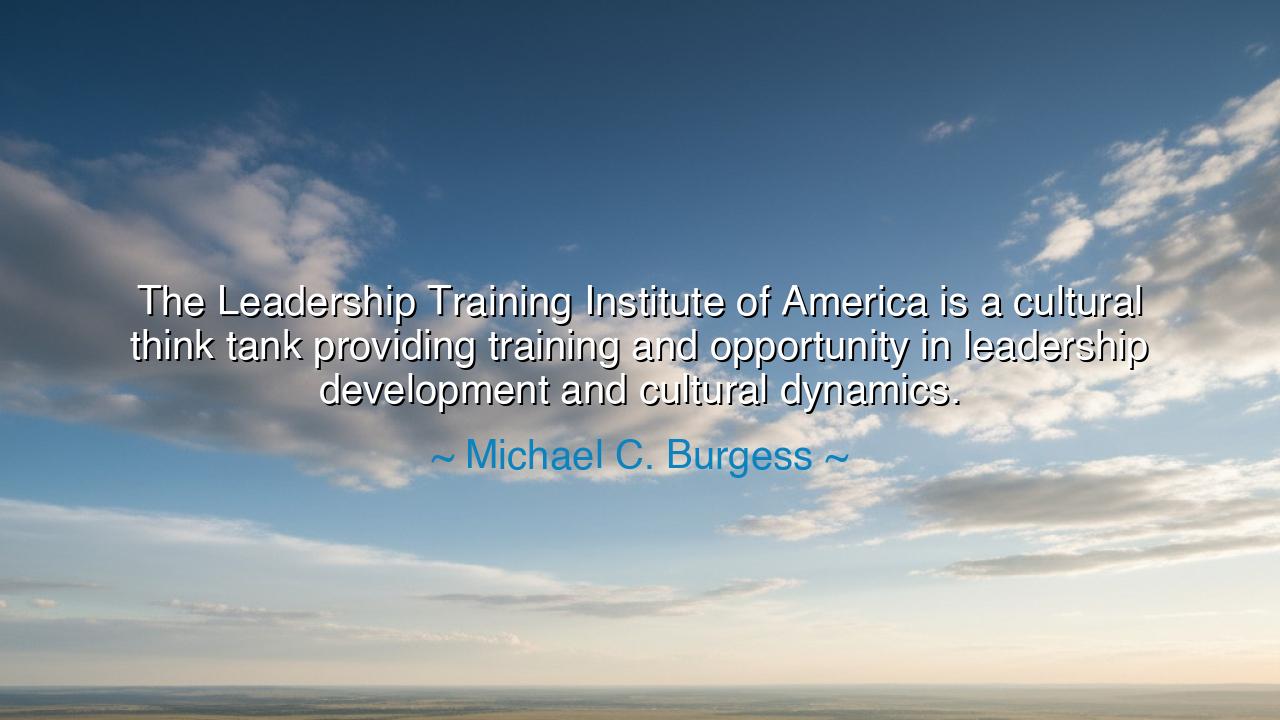
The Leadership Training Institute of America is a cultural think
The Leadership Training Institute of America is a cultural think tank providing training and opportunity in leadership development and cultural dynamics.






The words of Michael C. Burgess — “The Leadership Training Institute of America is a cultural think tank providing training and opportunity in leadership development and cultural dynamics” — sound at first like a simple description, yet within them lies a philosophy as deep as the roots of civilization. For in every age, the rise and fall of nations have depended not upon weapons or wealth, but upon the strength and wisdom of their leaders — men and women who understand both the power of knowledge and the rhythm of culture. Burgess’s statement speaks to this eternal truth: that leadership must be cultivated, not merely inherited; and that to shape the future, one must first understand the culture that breathes life into a people.
In the style of the ancients, we might say that leadership is both a science and a spirit. It is a flame passed from one generation to another, demanding both discipline and vision. The Leadership Training Institute of America stands as a modern temple of this art — a place where minds are sharpened not only through study, but through the living dialogue between values, traditions, and change. Burgess calls it a “cultural think tank,” for leadership cannot exist in isolation. It must engage with the culture it seeks to guide — understanding its myths, its morals, and its momentum. The true leader is not a ruler standing above his people, but a translator between the past and the future, between what is and what can be.
Throughout history, we see that every golden age began with such places of learning. In ancient Greece, the Academy of Plato trained leaders not by teaching them to command armies, but to rule their own souls. In China, the teachings of Confucius forged a system where moral virtue became the foundation of governance. In the American republic, the Founding Fathers studied philosophy, law, and history, believing that the training of the mind was the surest safeguard of liberty. Burgess’s description of this Institute echoes these timeless traditions — that leadership must grow from reflection, dialogue, and a profound understanding of the human condition.
But Burgess also points to something deeper when he speaks of “cultural dynamics.” Culture is not static; it shifts like the tides, and leaders must learn to move with it without losing their footing. The art of leadership is not domination, but adaptation guided by principle. The greatest leaders — from Lincoln to Mandela — were students of their people’s hearts. They listened to the hidden music of their age and transformed it into harmony rather than chaos. The Institute Burgess describes exists to cultivate this very balance — to teach leaders not only how to act, but when to act, and why.
Consider the story of Nelson Mandela, whose leadership was born not from privilege, but from purpose. For twenty-seven years, he studied his oppressors as much as his own ideals, learning the dynamics of power and culture that shaped South Africa. When freedom came, he used that knowledge not to divide, but to unite. He understood that a nation’s healing required more than laws — it required cultural understanding. His journey mirrors the essence of Burgess’s vision: leadership rooted in wisdom, strengthened by empathy, and guided by knowledge.
The origin of Burgess’s statement lies in his lifelong commitment to civic growth and education. As a public servant and physician, he understood that a nation’s health depends not only on its physical well-being but on the vitality of its moral and intellectual leaders. By describing the Leadership Training Institute as a think tank, he acknowledges that leadership cannot be improvised — it must be learned, practiced, and passed on through institutions that challenge the mind and awaken the conscience.
Thus, the lesson is clear: leadership begins in learning. Every generation must raise up its thinkers, its servants, its bridge-builders — those who can discern truth amidst confusion and guide others toward it. If you would lead, first study. Learn your culture, your history, and your people. Reflect upon the forces that shape your time, and find the courage to shape them in return. Leadership is not a crown bestowed, but a burden chosen — one that demands wisdom, compassion, and constant growth.
And so, let these words endure as a call to all who would serve: seek not power, but purpose. Enter the halls of learning as warriors of the mind, humble before truth yet fearless in action. For when knowledge meets character, and culture meets conscience, leadership becomes not a privilege, but a sacred trust — one that can renew a nation, elevate its people, and carry the torch of civilization ever forward.






AAdministratorAdministrator
Welcome, honored guests. Please leave a comment, we will respond soon